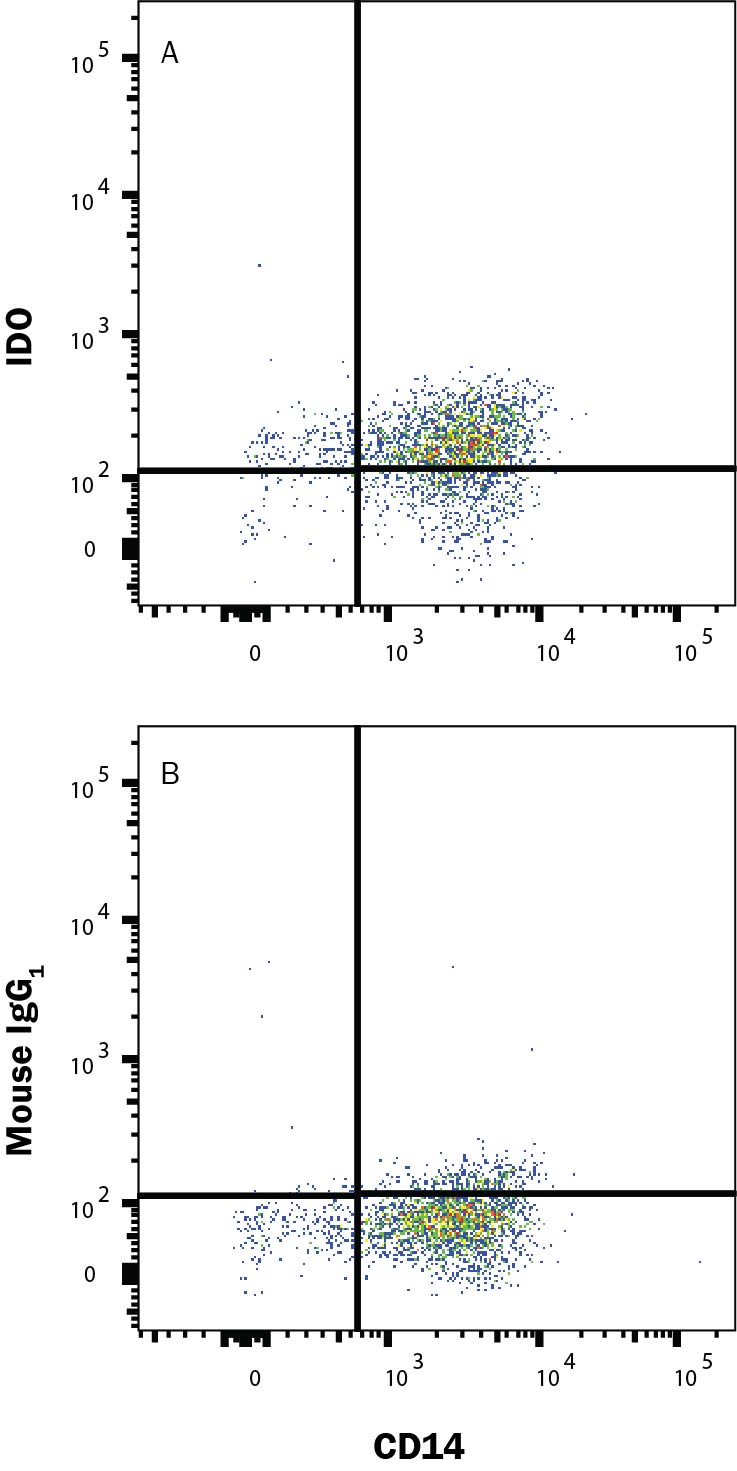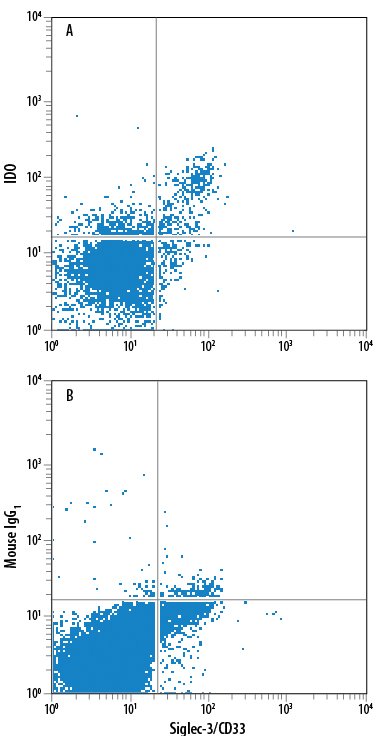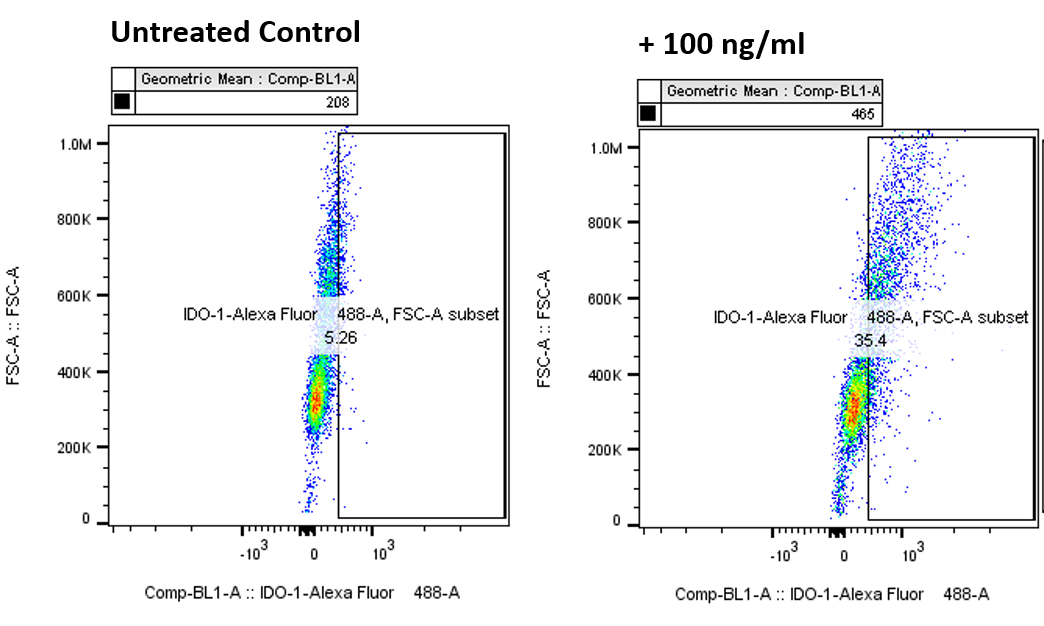Human Indoleamine 2,3-dioxygenase/IDO Alexa Fluor® 488-conjugated Antibody
Human Indoleamine 2,3-dioxygenase/IDO Alexa Fluor® 488-conjugated Antibody Summary
Ala2-Gly403
Accession # P14902
Applications
Please Note: Optimal dilutions should be determined by each laboratory for each application. General Protocols are available in the Technical Information section on our website.
Scientific Data
 View Larger
View Larger
Detection of Indoleamine 2,3‑dioxygenase/IDO in Human Monocytes by Flow Cytometry. Human Monocytes were selected from PBMC using MagCellect Human CD14+ Cell Isolation Kit (MAGH105) and cultured overnight with Recombinant Human MCSF (50 ng/mL; 216-MC), Recombinant Human IFN gamma (50 ng/mL; 285-IF) and 50 ng/mL LPS and stained with (A) Mouse Anti-Human Indoleamine 2,3-dioxygenase/IDO Alexa Fluor® 488-conjugated Monoclonal Antibody (Catalog # IC6030G) or (B) Mouse IgG1 isotype control antibody (IC002G) and Mouse Anti-Human CD14 PE-conjugated Monoclonal Antibody (FAB3832P). To facilitate intracellular staining, cells were fixed and permeabilized with FlowX FoxP3/Transcription Factor Fixation & Perm Kit (FC012). Staining was performed using our Staining Intracellular Molecules protocol.
 View Larger
View Larger
Detection of Indoleamine 2,3‑dioxygenase/IDO in Human MDSCs by Flow Cytometry. Human myeloid-derived suppressor cells (MDSCs) treated with 10 ng/mL Recombinant Human IL-6 (Catalog # 206-IL) and 10 ng/mL Recombinant Human GM-CSF (Catalog # 215-GM) for 7 days were stained with Mouse Anti-Human Siglec-3/CD33 APC-conjugated Monoclonal Antibody (Catalog # FAB1137A) and either (A) Mouse Anti-Human Indoleamine 2,3-dioxygenase/IDO Alexa Fluor® 488-conjugated Monoclonal Antibody (Catalog # IC6030G) or (B) Mouse IgG1Alexa Fluor 488 Isotype Control (Catalog # IC002G). To facilitate intracellular staining, cells were fixed with Flow Cytometry Fixation Buffer (Catalog # FC004) and permeabilized with Flow Cytometry Permeabilization/Wash Buffer I (Catalog # FC005). View our protocol for Staining Intracellular Molecules.
Reconstitution Calculator
Preparation and Storage
- 12 months from date of receipt, 2 to 8 °C as supplied.
Background: Indoleamine 2,3-dioxygenase/IDO
Indoleamine 2,3-dioxygenase (also known as IDO) is a heme-containing intracellular dioxygenase catalyzing the degradation of the essential amino acid L-tryptophan to N-formyl-kynurenine (1). This degradation is the first and rate-limiting step of the L-kynurenine pathway (2). IDO is widely expressed in dendritic cells, macrophages, microglia, eosinophils, fibroblasts, endothelial cells, and most tumor cells. In immune cells, its expression is mainly induced by cytokines such as IFN‑ gamma, IFN-alpha, IFN-beta, and IL‑10. IDO has an antimicrobial function due to its decreasing the availability of the essential amino acid tryptophan in inflammatory environments (3). Recent studies have demonstrated that IDO induces immunosuppression during infection, pregnancy, transplantation, autoimmunity, and neoplasia (3-5).
- Lewis-Ballester, A. et al. (2009) Proc. Natl. Acad. Sci. USA. 106:17371.
- Costantino, G. (2009) Expert Opin. Ther. Targets 13:247.
- Xu, H. et al. (2008) Immunol. Lett. 121:1.
- Lob, S. et al. (2009) Nat. Rev. Cancer 9:445.
- Curti, A. et al. (2009) Blood 113:2394.
Product Datasheets
Product Specific Notices
This product is provided under an agreement between Life Technologies Corporation and R&D Systems, Inc, and the manufacture, use, sale or import of this product is subject to one or more US patents and corresponding non-US equivalents, owned by Life Technologies Corporation and its affiliates. The purchase of this product conveys to the buyer the non-transferable right to use the purchased amount of the product and components of the product only in research conducted by the buyer (whether the buyer is an academic or for-profit entity). The sale of this product is expressly conditioned on the buyer not using the product or its components (1) in manufacturing; (2) to provide a service, information, or data to an unaffiliated third party for payment; (3) for therapeutic, diagnostic or prophylactic purposes; (4) to resell, sell, or otherwise transfer this product or its components to any third party, or for any other commercial purpose. Life Technologies Corporation will not assert a claim against the buyer of the infringement of the above patents based on the manufacture, use or sale of a commercial product developed in research by the buyer in which this product or its components was employed, provided that neither this product nor any of its components was used in the manufacture of such product. For information on purchasing a license to this product for purposes other than research, contact Life Technologies Corporation, Cell Analysis Business Unit, Business Development, 29851 Willow Creek Road, Eugene, OR 97402, Tel: (541) 465-8300. Fax: (541) 335-0354.
Citations for Human Indoleamine 2,3-dioxygenase/IDO Alexa Fluor® 488-conjugated Antibody
R&D Systems personnel manually curate a database that contains references using R&D Systems products. The data collected includes not only links to publications in PubMed, but also provides information about sample types, species, and experimental conditions.
6
Citations: Showing 1 - 6
Filter your results:
Filter by:
-
Tolerogenic IDO1+CD83- Langerhans Cells in Sentinel Lymph Nodes of Patients with Melanoma
Authors: G Gerlini, P Di Gennaro, N Pimpinelli, S Sestini, L Borgognoni
International Journal of Molecular Sciences, 2022-03-22;23(7):.
Species: Human
Sample Types: Whole Cells
Applications: Flow Cytometry -
Decidual IDO+ macrophage promotes the proliferation and restricts the apoptosis of trophoblasts
Authors: HL Huang, HL Yang, ZZ Lai, SL Yang, MQ Li, DJ Li
Journal of reproductive immunology, 2021-08-23;148(0):103364.
Species: Human
Sample Types: Whole Cells
Applications: Flow Cytometry -
Human type 1 and type 2 conventional dendritic cells express indoleamine 2,3-dioxygenase 1 with functional effects on T cell priming
Authors: SP Sittig, JJP van Beek, G Flórez-Gra, J Weiden, SI Buschow, MC van der Ne, R van Sloote, MM Verbeek, PBH Geurtz, J Textor, CG Figdor, IJM de Vries, G Schreibelt
European Journal of Immunology, 2021-03-22;0(0):.
Species: Human
Sample Types: Whole Cells
Applications: Flow Cytometry -
CD4+ T cell-derived IL-21 and deprivation of CD40 signaling favor the in vivo development of granzyme B-expressing regulatory B cells in HIV patients.
Authors: Kaltenmeier C, Gawanbacht A, Beyer T, Lindner S, Trzaska T, van der Merwe J, Harter G, Gruner B, Fabricius D, Lotfi R, Schwarz K, Schutz C, Honig M, Schulz A, Kern P, Bommer M, Schrezenmeier H, Kirchhoff F, Jahrsdorfer B
J Immunol, 2015-03-16;194(8):3768-77.
Species: Human
Sample Types: Whole Cells
Applications: Flow Cytometry -
Induction of indoleamine 2,3-dioxygenase by Borrelia burgdorferi in human immune cells correlates with pathogenic potential.
Authors: Love A, Schwartz I, Petzke M
J Leukoc Biol, 2014-11-24;97(2):379-90.
Species: Human
Sample Types: Whole Cells
Applications: Flow Cytometry -
Early growth response-2 signaling mediates immunomodulatory effects of human multipotential stromal cells.
Authors: Barbeau, Dominiqu, La, Kiet Tra, Kim, Duk Soo, Kerpedjieva, Svetosla, Shurin, Galina V, Tamama, Kenichi
Stem Cells Dev, 2013-10-05;23(2):155-66.
Species: Human
Sample Types: Whole Cells
Applications: Flow Cytometry
FAQs
No product specific FAQs exist for this product, however you may
View all Antibody FAQsReviews for Human Indoleamine 2,3-dioxygenase/IDO Alexa Fluor® 488-conjugated Antibody
Average Rating: 5 (Based on 1 Review)
Have you used Human Indoleamine 2,3-dioxygenase/IDO Alexa Fluor® 488-conjugated Antibody?
Submit a review and receive an Amazon gift card.
$25/€18/£15/$25CAN/¥75 Yuan/¥2500 Yen for a review with an image
$10/€7/£6/$10 CAD/¥70 Yuan/¥1110 Yen for a review without an image
Filter by:
HCT-116 cells were treated with rhIFN-gamma overnight and intracellular IDO expression was analyzed by Flow Cytometer


